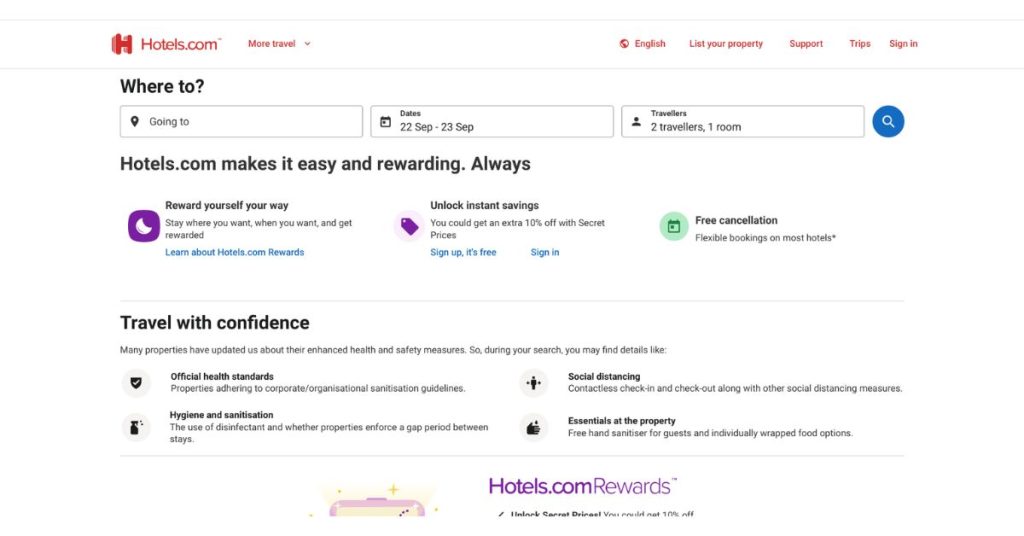

Are Hotels.com and Booking.com the same online travel agencies? This comprehensive guide will explore the similarities and differences between these two leading platforms. Many travelers are often confused about the services offered by each platform and the potential differences in their respective search algorithms. This article aims to shed light on these discrepancies and help you find the best deals on hotel accommodations and enhance your travel planning. We’ll dive into their features, functionalities, and explore when each platform might be the better choice for your needs. The structure of this article is as follows: first, we’ll discuss the similarities and differences between the two; next, we’ll examine specific functionalities, such as price comparison, filtering options, and customer reviews. Finally, we’ll offer a conclusion with a clear recommendation, along with frequently asked questions for a thorough understanding.
Similarities and Differences:
Overlap in Services
Both Hotels.com and Booking.com are prominent online travel agencies (OTAs) that facilitate hotel bookings. They essentially function as online marketplaces connecting travelers with hotels worldwide. They both offer a vast selection of hotels, allowing users to compare prices, read reviews, and book accommodations. They also boast similar user interfaces and navigation designs. This shared functionality makes it tempting to think they are identical but subtle differences remain.
Price Comparison and Availability
While both sites advertise competitive pricing, the actual prices displayed might fluctuate depending on factors like demand, seasonality, and specific room types. Comparing prices across both platforms is a smart way to identify any potential variation. In summary, they have a very similar range of offerings and services.
User Experience
Both sites are user-friendly, with clear navigation and search functionality. Finding specific hotels, filtering results by price, amenities, or location is straightforward on both platforms. Both also prioritize displaying customer reviews and ratings.
Payment Options and Security
Both platforms accept various payment methods and prioritize the security of transactions, although their exact security measures may vary slightly. These measures protect user data and payment information, contributing to the confidence users have in both platforms.
Feature Comparison:
Search Functionality
Both platforms provide a strong search engine for finding hotels. Users can filter by price, location, amenities (e.g., swimming pool, gym, parking), star ratings, and more. The filtering tools on both sites are generally similar in terms of ease of use.
User Reviews
Both websites highly value customer reviews. Detailed reviews allow users to assess the actual quality of a hotel. Both Platforms also include filtering to narrow search results based on guest feedback.
Special Deals and Promotions
Both sites regularly feature deals, discounts, and promotions. However, the specific offers and details may differ. It’s important to regularly check both for the most updated deals.
Customer Support:
Contact Options
Both Hotels.com and Booking.com offer customer support options. Both websites usually have FAQs and contact forms that provide initial support. These contact options can assist with any booking-related problems. Users should note that specific response times and quality of support may vary.
Dispute Resolution
Both platforms have procedures to handle complaints and resolve disputes related to bookings. They operate under a clear protocol to address these issues, which often includes providing avenues for communication between both parties involved.
Conclusion
While both are similar in customer support functionality, minor discrepancies in support responsiveness and issue resolution may occur.
Specific Hotel Amenities:
Fine-tuning Search Results
Both platforms allow users to specify criteria like desired hotel amenities. Users can filter results to display only hotels with specific features, such as pools, gyms, or parking facilities. This detailed filtering helps narrow the selection process.
Accessibility
Both platforms are designed to be accessible for users of varying abilities, although variations in design may appear minor. Both sites offer features like screen readers and keyboard-only navigation, ensuring inclusivity. These platforms prioritize accessibility in their design.
Related Post : have hotel
Booking Process and Confirmation:
Booking Procedure
Both sites follow a straightforward booking procedure, although their minor differences may exist. Both platforms allow secure online payment options.
Confirmation Process
Both platforms provide comprehensive confirmation details, including booking number, payment information, hotel details, and contact information. These confirmation steps ensure transparent and clear information exchange.
Security Measures
Both websites prioritize the security of customer data and transactions through industry-standard security measures. These platforms consistently update their security protocols for added protection.
Pricing and Value:
Comparison of Rates
Comparing rates and searching for deals on both platforms is recommended for the best value. Checking both is an important step to compare prices and find the best option.
Hidden Costs
Carefully review all associated costs, including taxes and fees, before finalizing the booking to avoid any unexpected surprises.
Best Deal Strategies
Checking both sites for discounts, deals, and promotions is advisable to get the best value.
Mobile Experience:
Mobile Apps
Both platforms have dedicated mobile apps for seamless booking on the go. These apps provide easy access and streamlined navigation on mobile devices.
Features on Mobile
Features like quick searches, easy booking, and notifications for booking confirmations and special offers are available on mobile.
User Interface
The mobile apps usually have a user-friendly design that enhances the mobile experience.
Additional Services:
Package Deals
Both platforms sometimes offer bundled travel packages that include flights, accommodations, and other travel services. These package deals are worth considering for a more comprehensive travel experience.
Car Rentals
Both websites might integrate car rental services, helping users book rentals in conjunction with their accommodations.
Guided Tours
Users might find pre-arranged excursions or guided tours that complement their travel plans, potentially offered through these platforms.
Conclusion Summary:
Recap
Both Hotels.com and Booking.com are reputable online booking platforms with considerable overlap in functionality and services. Their similarities include a vast selection of hotels, easy navigation, customer reviews, and secure payment options. They can help plan, book, and potentially find deals.
Best Strategy
Comparing prices and amenities on both platforms will yield the optimal value and avoid missing potential deals.
Next Step
Explore the finer details of each platform, paying attention to their special offers, amenities, and customer reviews to make the best choice for your specific needs. Use the tools, compare pricing, and filter results for the ideal travel accommodations.
In conclusion, while Hotels.com and Booking.com offer similar services, understanding their subtle differences is key to making informed travel decisions. Consider your specific needs, such as price sensitivity, desired amenities, or specific hotel preferences when choosing the platform for your next booking. For the best deals and comprehensive information, regularly check both platforms and compare available options. Happy travels!